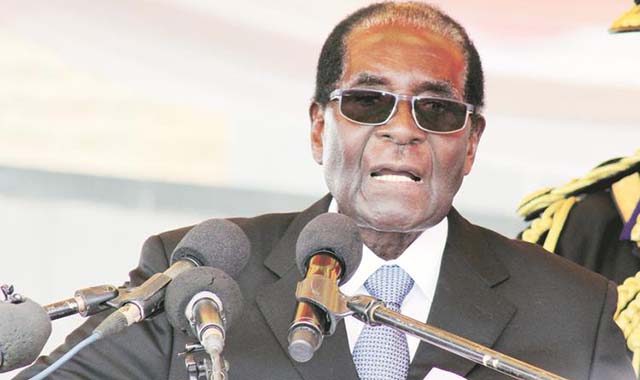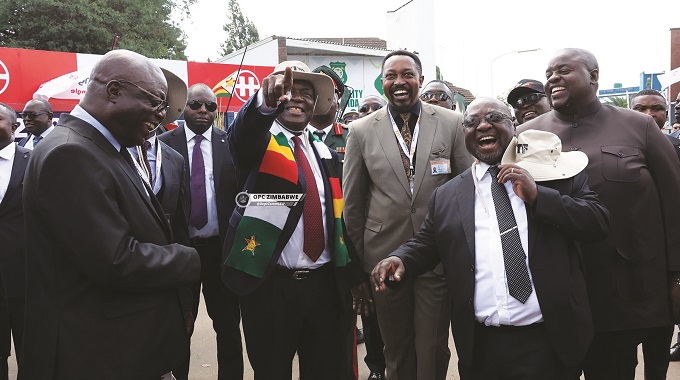CIVIL SERVICE MASTERMIND LAID TO REST


President Mugabe delivers the keynote address at the burial of the late national hero , Dr Charles Utete, in Harare yesterday
Lloyd Gumbo Harare Bureau
President Mugabe yesterday hailed the late national hero, Dr Charles Utete for establishing the foundation of the civil service in independent Zimbabwe that saw him formulate and implement Government policies as well as give advice to the President as a member of the executive council.
Dr Utete was the first black chief secretary in the office of the then Prime Minister and later on President after independence.
In his key note address during the burial of Dr Utete at the National Heroes Acre in Harare yesterday, President Mugabe said the late national hero played a major role in the development of Zimbabwe from policy formulation and implementation to the signing of the Unity Accord between the country’s two revolutionary parties Zanu and PF-Zapu in 1987.
“Dr Charles Utete’s public service career equates with the founding and development of our civil service soon after Independence,” said President Mugabe.
“In fact, scholars like him made invaluable inputs into the governing vision which guided us. Alongside many committed scholars, Dr Utete made incisive inputs into our policy documents, in the process transforming a majority rule Government.
“Every inch a scholar, a deep, practical thinker, Dr Utete’s intellectual outputs, in many ways, impacted the mind of the Government.
“After the March 1980 elections, one of the biggest challenges we faced was running a government without an iota of experience. So daunting was the prospect that we even went so far as appealing to Lord Soames, to stay on at the helm, while we gathered the requisite experience.”
President Mugabe said the biggest challenge in running the civil service in independent Zimbabwe was that no African had played such a role during the settler rule as that regime was founded on the principles of racial segregation, which was exclusively white.
He said the new Government had to identify citizens who had been educated outside Zimbabwe but had come back after the country gained Independence or those that were willing to come back and serve Zimbabweans under the new Government.
Dr Utete had voluntarily come back to Zimbabwe in 1979.
“We knew his views; contributions; above all, we knew his readiness to serve the people.
“I therefore didn’t hesitate to invite him to serve as the first black permanent Secretary to the Office of the Prime Minister and Cabinet.
“I can only imagine what went through his mind at this appointment. True, he had read and mastered principles of public administration and economics, but he had never been in charge of a ministry, let alone of the whole of the Civil Service, which is what this appointment entailed,” said President Mugabe.
“In his characteristic quiet and unassuming way, he accepted the burdensome appointment, burning the midnight oil in reshaping the whole bureaucracy, in line with our new policy to make it reflect the racial composition of the society it served.
“We had to Africanise it but without denting its capacity to deliver efficient and expanded services beyond its elitist white remit under Rhodesia. It was completely a white public service. There wasn’t a single African called permanent secretary in the service, neither director. No civil servant under the settler rule but employees only of the Government, we were told.”
President Mugabe said Dr Utete was instrumental in ensuring that Cabinet worked smoothly, meeting weekly deadlines for routine Tuesday Cabinet meetings.
He said it had to take a disciplined cadre, an orderly mind and tireless officer for everything to happen.
“Today, in that tiny casket lies the chief architect of our civil service as we have it completely revolutionary, completely African.
“Beyond reshaping and coordinating the running of the bureaucracy, Dr Utete was at the centre of our policy formulation.
“We were a society fractured by the liberation war. The new government had to hit the ground running. Dr Utete was at the centre of formulating policy blueprints, on the strength of which the new government responded to all these unmet needs. More and more needs coming. Never stopping. Ever always soaring expectations, ever soaring expectations,” said President Mugabe.
He said the Government had to integrate the war-displaced and rehabilitate all the people who were traumatised by the war as well as to reconcile the society.
President Mugabe said this needed a man of multiple abilities, someone who was able to develop and engender a team spirit within departments of the Government.
He said the other daunting task for Dr Utete came with the Land Reform Programme, which was also his belief and blueprint for an independent Zimbabwe.
President Mugabe implored beneficiaries of the land reform programme to fully utilise their land so that the country can produce sufficient food to feed its citizens.
“A true land reform programme must give way to agrarian reforms and programmes. We should never hunger. Never import food. Never ever. There is no point. Those with land must please use it properly to produce.
“Those who need it, let them have it. Let them have it to use it to produce not to use it to sit on it and to pride themselves in saying we now have land. ‘I’m somebody because I have the land’. Yes, you’re somebody because you have the land but the land must be used so you become a real somebody. Otherwise you are not a real somebody,” said President Mugabe.
He said Dr Utete also helped in the Unity Accord agreement as he was a source of harmony and not disharmony.
The President took a swipe at #ThisFlag campaigner, Pastor Evan Mawarire, who has been advocating for protests under the ambit of “Shutdown Zimbabwe”.
“The Mawarires and those who believe in that way of living in our country, well, are not part of us. They are not part of us in thinking. They are not part of us, as we try to live together.
“If they don’t like to live with us, let them go to those who are sponsoring them. To the countries of those who are sponsoring them.
“You can’t urge people to adopt violence. Violent demonstrations as a way of solving grievances. No! We will say no! Forever no! Find another environment if you are a pastor. I don’t know if he is a man of religion. A man of religion we would hope, would preach biblical peace. First Corinthians, what does it say? Love one another. Not destroy one another, fight one another! So, beware these men of cloth, not all of them are true preachers of the Bible. I don’t know whether they are serving God. Well, we spell God, G.O.D, they spell G.O.D in reverse,” said President Mugabe.










Comments